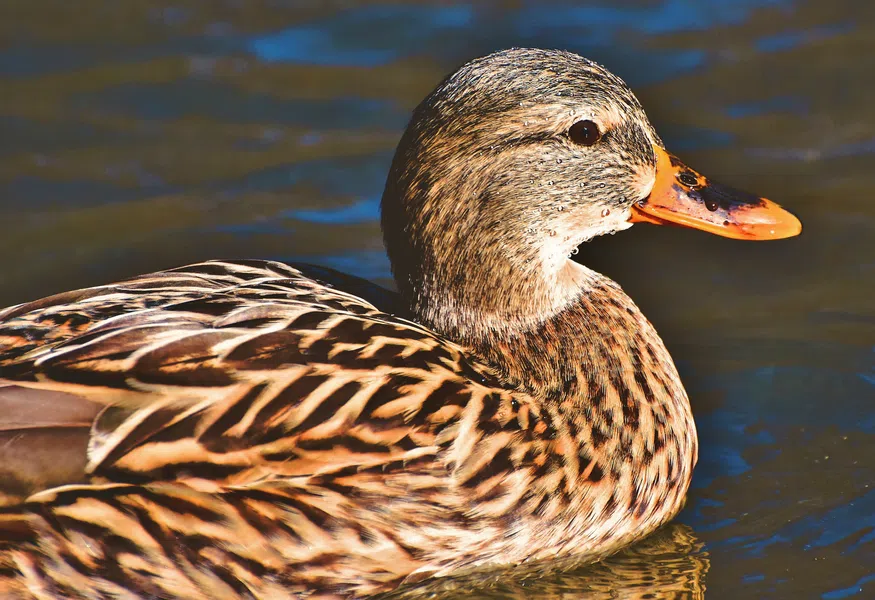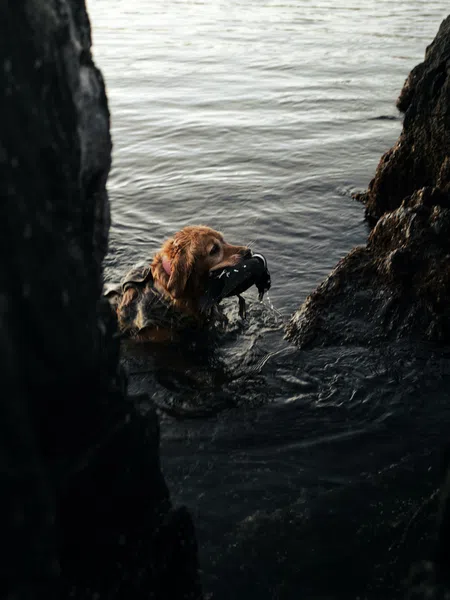
The Wild Duck Summary
Gregers Werle has just returned home after spending fifteen years at the mines, avoiding his father, Hakon Werle. Gregers has become an idealist, and he abhors his father for his propensity to lie. Gregers blames Werle for causing the ruin of the Ekdal family: Lieutenant Ekdal was a respected man and Werle's business partner before Werle pinned a scandal on him. Ekdal was sent to jail, and his family lost everything. He now works for Werle. Gregers also believes his mother was killed by Werle's constant infidelity, which drove the sickly woman to her deathbed.
An idealist is someone guided by their values (in Gregers's case, honesty and truth) instead of practicality. As opposed to seeing the world how it actually is, Gregers attempts to make life fit into his vision of a perfect reality. Idealism is the unrealistic pursuit of these values.

Fig. 1: After his mother dies, Gregers leaves home for fifteen years.
In the opening scene, Werle is throwing a dinner party to celebrate Gregers's return home. Unbeknownst to Werle, Gregers has invited Hialmar Ekdal, Ekdal's grown son and Gregers's childhood friend; Werle does not approve. Gregers and Hialmar begin talking, and Hialmar tells Gregers how Werle helped him get a career in photography and arranged his marriage to Gina. Gregers is bothered when he learns Gina worked for Werle during Mrs. Werle's illness and is shocked his father helped Hialmar.
The text was translated from Norwegian; depending on the translation, Hialmar may be spelled as Hjalmar.
Hialmar feels out of place surrounded by Werle and his influential friends. When the nearly-blind Ekdal stumbles in, Werle gasps in disgust, and Hialmar acts as though he doesn't know his father. Ekdal leaves, apologizing for the intrusion. Gregers is shocked that Hialmar denied his father, but Hialmar says if Gregers had experienced the shame of the scandal, he would do the same. Hialmar leaves the party dejected.
Gregers pulls his father aside and accuses him of ruining Ekdal by using him as a scapegoat in their failed business venture. Gregers also tells Werle he knows about Werle's affairs, and he believes Gina was one of his mistresses. Werle rebukes his son and denies the allegations, telling Gregers he is too much like his mother. Werle then reveals he wants to marry his servant, Mrs. Sorby, and seeks Gregers's approval. Gregers leaves the house saying he realizes his life's purpose—which is later revealed to be uncovering the truth of Werle's lies.

Fig. 2: Gregers is determined to uncover his father's infidelity.
At Hialmar's studio, the Ekdals appear to live the perfect image of domesticity: Gina takes care of the family's finances and sews, Hialmar runs his studio, and Hedvig, their daughter, loves both of them unconditionally. Gregers goes to Hialmar's home after the party. He asks Hialmar about Hedvig, who he discovers is fourteen and slowly going blind. Hialmar calls her their biggest joy and greatest sorrow.
Gregers asks Ekdal about hunting, remembering that Ekdal was once a great hunter. To Hialmar's embarrassment, Ekdal takes Gregers up into their loft, where they keep birds and rabbits. The family also shows Gregers Hedvig's greatest treasure, a wild duck the Ekdal's saved after Werle shot it. Gregers asks if he can rent their extra room and stay with them.

Fig. 3: Hedvig's prized possession is the wild duck in her attic.
The next day, Gregers is shocked to discover Hedvig doesn't go to school. Hialmar removed her when her eyesight worsened, promising he would continue her education, but he hasn't. Gregers also discovers Ekdal and Hialmar "hunt" the rabbits in the attic. Hialmar says it helps the old man feel like a hunter again. Hialmar tells Gregers he is working on an invention that will change the Ekdals' life. Hialmar doesn't know what it is yet, but he spends much of his time thinking about it.
Gregers and Hialmar go on a walk, where Gregers tells Hialmar about Gina's affair with Werle. Hialmar comes home angry and hostile to both Gina and Hedvig. He says he will take full control of their accounts and never go to the attic again. When Hedvig asks about the wild duck, Hialmar tells her he would kill it if it wasn't for her. Hedvig leaves the room, and Hialmar confronts Gina about her relationship with Werle. She admits Werle forced her to have sex with him. Hialmar is furious and says he wouldn't have married her if he knew, but Gina swears she loves him.
Hedvig comes down and shows her parents a birthday present from Werle. He has given Ekdal a monthly salary until Ekdal's death, which will then transfer to Hedvig. Hialmar rips up the letter. Gina admits she does not know who Hedvig's father is, and Hialmar flees. Hedvig is miserable that her father has left her, and Gregers convinces her that killing the duck will prove her love for her father.
The next morning, Hialmar shows up at the house disheveled. He berates Hedvig again, and she runs into the attic with the pistol. When the family hears a gunshot ring out, Gregors announces Hedvig has sacrificed the wild duck to repair her relationship with her father. Upon going to the attic, the family discovers Hedvig has shot and killed herself.
The Wild Duck Characters
The main characters in the play are the members of the Werle family and the members of the Ekdal family.
Gregers Werle
The idealistic son of Hakon Werle, Gregers detests his father and his lies. Gregers wants to make amends for what Werle did to the Ekdal family and tells them the truth in order to avenge his life. Although he is well-intentioned, Werle's blind pursuit of the truth causes tragedy for the Ekdals.
Hialmar Ekdal
The childhood friend of Gregers, Hialmar's ultimate goal is to restore his family name and get the Ekdals' dignity back. He is constantly thinking about an invention that will make his dreams possible—earning the family a lot of money and allowing them to be financially independent. Hialmar is loving and trusting; his entire perspective of the world shifts when he discovers Gina's affair.
Hedvig Ekdal
The fourteen-year-old daughter of Hialmar and Gina, Hedvig is a happy young girl who aims to please her parents. She is slowly going blind, so her father has taken her out of school. She spends much of her time doting on her wild duck, although she resolves to kill it if it means protecting her father. It isn't clear whether Hialmar or Werle is her biological father.
Gina Ekdal
Hedvig's mother and Hialmar's wife, Gina was a servant at Werle's house before she married Hialmar. Werle forced her to have sex with him and then married her off to Hialmar to cover up a possible scandal. Gina is not sure who Hedvig's biological father is, and she kept her relationship with Werle a secret.
Lieutenant Ekdal
Once a respected member of the community, Ekdal experienced total social ruin at the hands of his old business partner. When their company was called into question, Werle pinned the blame on Ekdal, landing him in jail and ruining his family name. Ekdal is now a ruined man with a limp and poor eyesight—a shadow of his former self.
Hakon Werle
Gregers's father, Hakon Werle is a manipulative, scheming businessman. He is incredibly wealthy and uses others as pawns in his life. At the start of the play, Werle seems more interested in tying up loose ends and protecting his family than in causing further damage.
Bertha Sorby
Werle's servant and fiancee, Bertha Sorby is the only character that actually knows Werle. Their relationship is based on honesty and trust.
The Wild Duck Analysis
The Wild Duck contains quite a few instances of symbolism, but none are as important as the wild duck itself. The plight of the wild duck—which has been injured, rescued, trapped, and metaphorically lost—reflects the lives of the characters in many ways. The only two characters who are not reflected in the duck are Werle and Mrs. Sorby, as they have come to terms with their lives and are no longer weighed down by past wounds.
The character the duck most represents is the tragic Hedvig. Once innocent and full of possibilities, Hedvig's life has been shot down by her blindness and Hialmar's protectiveness. She now lives trapped in her own house, like the duck in the attic, ignorant to what she is missing in the outside world. Hedvig is Gina's daughter, but it is unclear who Hedvig's father is. Like the duck, the Ekdals are not truly in control of their own lives. Rather, they are controlled by Merle, who oversees their lives casually and carelessly. Like the duck, Hedvig is ultimately an indirect gift from Merle, whether as his actual daughter or as a result of the marriage he orchestrated.
A tragic character is virtuous, likable, and sympathetic, but they often have a fatal flaw that leads o their suffering or death.
Gregers sees Hialmar as the duck sinking to the bottom of his sea of troubles (or the lies of his life). Ever an idealist, Gregers sees himself as the valiant dog rescuing the duck (Hialmar) from drowning. Like Merle's dog, Gregers causes irrevocable damage to Hialmar, which stays with him for the rest of his life. Hialmar's marriage might be free of lies, but Hialmar will be forever burdened with the loss of his daughter.

FIg. 4: Gregers sees himself as Werle's dog, saving Hialmar, the duck, from its watery fate.
The Wild Duck Themes
The main themes in Ibsen's play are reality vs. idealism and the complexity of familial relationships.
Reality vs. Idealism
Gregers is so determined to uncover the truth, his idealism ultimately ruins Hialmar's reality. Gregers preaches the truth at all costs, believing all can be forgiven and repaired once the truth is known. Gregers is so hell-bent on divulging his father's secrets that he rips apart his friend's entire world, making Hialmar question his marriage, his child, and even his identity. Hialmar's reality comes crashing down around him, making him reconsider everything about his life. This new reality splits the Ekdal family apart. The domestic life they had been content living is upended by Gregers's heedless push toward his own ideal.
The Complexity of Familial Relationships
The complexity of familial relationships is revealed in both the Ekdal and Werle families. Gregers has a contentious relationship with his own father. He abhors Werle's lies, believes he caused Mrs. Werle's death, and thinks Werle is always playing an end game. Gregers projects his own unhappiness with his father unto the Ekdals, forcing all their secrets out to remove the poison he believes is overtaking their lives.
Several characters condemn Gregers for meddling. What is your opinion? Is it ever okay to keep secrets? Did Gregers do the right thing?
What Gregers fails to understand is the nuances that exist in each family. His relationship with his father is nothing at all like the Ekdals' relationship with one another. Every relationship is dictated by the complexities of the individual people involved. Before Gregers got involved, the Ekdals were living a life that worked for them: they were happy, close, and full of love. It might not have been Gregers's ideal, but they were content with their version of domestic life. While the secrets between Werle and Gregers drove them apart, Hialmar and his family built their entire basis of reality on a falsehood. The secrets Gregers fought to expose were ultimately the glue holding the Ekdals together.
The Wild Duck Quotes
Below are some of the important quotes in The Wild Duck.
GREGERS: Poor unfortunate old man! Yes; he has indeed had to narrow the ideals of his youth.
RELLING: While I think of it, Mr. Werle, junior don't use that foreign word: ideals. We have the excellent native word: lies.
GREGERS: Do you think the two things are related?
RELLING: Yes, just about as closely as typhus and putrid fever.
GREGERS: Dr. Relling, I shall not give up the struggle until I have rescued Hialmar from your clutches!
RELLING: So much the worse for him. Rob the average man of his life−illusion, and you rob him of his happiness at the
same stroke." (Act V)
In this conversation between Gregers and Dr. Relling, who lives below the Ekdals, the two men argue over the nature of ideals and lies. Whereas Gregers believes wholeheartedly in pursuing the ideal life, free from lies, Relling believes that course of action is dangerous. Unlike Gregers, Relling realizes how deeply Hialmar relies on his version of reality, even if it's unachievable and incorrect. Relling tells Gregers he will ruin Hialmar if he takes away his reality and, thus, his hope.
The woods avenge themselves." (Act V)
The mysterious Ekdal paraphrases this quote three times over the course of the play. First, when he is speaking to Gregers in Act II about how the forests he used to hunt in have since been thinned due to industrialization. He mummers this quote twice again following Hedvig's suicide. Ultimately, her death can be seen as punishment for both the Ekdals and Werles for their superficial relationship to the world, treating nature as something to exploit and play with instead of seeing it as a reflection of themselves.
The Wild Duck - Key Takeaways
- The Wild Duck was published by Henrik Ibsen in 1884.
- The play centers around the lies/reality of the Werle and Ekdal families.
- When idealistic Gregers Werle decides to uncover the secrets of the Ekdal family, hoping to bring them closer, he inadvertently rips the family apart.
- The wild duck of the title—which has been injured, rescued, trapped, and lost—symbolizes what the characters have been through.
- The main themes are reality vs. idealism and the complexity of familial relationships.

Similar topics in English Literature
Related topics to American Drama













